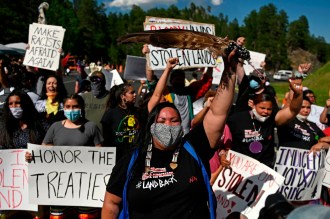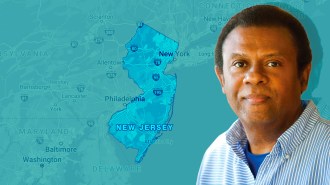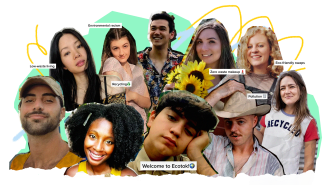Women around the globe bear the brunt of climate disaster. They are also the ones driving some of the most innovative and successful solutions. This International Women’s Day, Fix hosted an Instagram Live convo between two fabulous femmes and climate communicators: Grist 50 Fixers Maeve Higgins and Thanu Yakupitiyage took to IG to school us on artistic expression, immigration justice, and female leadership and ingenuity in the climate movement.
Maeve is a comic, writer, and co-host of the Mothers of Invention podcast. Thanu is an activist, DJ, and U.S. communications director at 350.org. Their whole conversation is fire — and one we highly recommend watching — but we’ve pulled together a few highlights here for your reading pleasure.
The following excerpts have been edited for length and clarity.
On their chosen art forms
Thanu: For me, DJ-ing is very much about joy. It’s about creating spaces to envision the world we want to see. Ten years ago, when I started in the immigrant rights movement, I often found that it was intense, policy-oriented work. That’s true of a lot of the social justice work that I do. We don’t always think, “OK, what are we fighting for?”
When I DJ, I curate spaces particularly for queer folks, for people of color, for immigrants to connect. It’s about building the world we’re fighting for — I feel an arts practice helps to do that. And I love comedy! I would love to know, for you, what that has to do with climate.
Maeve: That’s so funny, because that is what happened — what you mentioned about joy and levity being a crucial part of what a future would look like. I write about immigration, too, and I’m an immigrant myself. Moving to the U.S. as a white person from Europe really got me curious about other people’s experience, particularly if they’re not white and European. I think a lot of migration stories and climate stories are told like, “Here’s a victim, here’s a person whose life is made up of sadness and tragedy,” and that’s dehumanizing. Humor is a way of returning what’s already in people’s lives. No matter how dark things get, you’re going to giggle at a funeral. Your humanity is going to bubble up in some way.
On the right to migrate
Thanu: There’s a lot of updating that needs to happen to global immigration policy. When thinking about external migration, we have to think about the role of the United States, of Canada, of Europe, in creating this climate crisis. All of the most polluting industries are from the West. We have to connect climate to imperialism and colonialism, and to the right of communities from the Global South to be able to migrate for their safety and their prosperity.
Maeve: I really connect with that. Talking about this and explaining it to people is valuable work, and I love how you do that. I worry about the message that climate is a threat to national security. I don’t agree with that messaging, because it’s fear-based. What’s a good way to discuss this, and make it known?
Thanu: That framing is super dangerous. I actually think we have to be careful when people say governments should call a climate emergency — I’m like, “Hold up. Let’s actually think about what a national emergency entails. In a national emergency, borders are shut down and communities are oppressed.”
Maeve: That’s exactly how Trump created the “Remain in Mexico” program.
Thanu: Exactly. When it’s put in a national security frame, it’s actually super racist. It stops Black and brown communities from being able to cross borders. I think it’s important not to use the trope of “We have to do something about climate, because otherwise a billion people are going to migrate.” From my perspective, migration is a human right. We need to focus on the industries that have caused the climate crisis, not the vulnerable communities that are moving.
On International Women’s Day
Maeve: We know that the people who are affected first and worst by climate chaos are women. There’s a balance here, where you don’t want to be too prescriptive, especially with language, but you also want to point out that this is really important. On our podcast, Mothers of Invention, we honor the fact that women and femme people are so often the ones coming up with solutions in their communities and outside of their communities. That was kind of an exciting revelation for me, to be honest.
Thanu: That’s exactly right. When we think about the climate crisis, it’s often women who are also holding down the family dynamics, ensuring that their families and communities have food. And when you think about the places most impacted by the climate crisis, whether it’s parts of Africa or South Asia or the Pacific islands, it’s often women and femmes that are trying to figure out how we move from crisis and chaos to resilience and mitigation. And that’s what I love about your podcast, how y’all really center those solutions.
Maeve: There’s another podcast I’ve been listening to called Hot Take — it both enrages and energizes me. One of the hosts is a hardcore investigative journalist, Amy Westervelt, who’s been writing on climate for years and really has got the goods. The other host, Mary Heglar, is an absolutely gorgeous writer. Their podcast is giving me life at the moment. Do you have heroic femmes and women doing work in this space that you’d like to shout out?
Thanu: My friend Céline Semaan from The Slow Factory talks a lot about climate and fashion. And a lot of the climate youth, like Xiye Bastida and Helena Gualinga and Jamie Margolin — there are so many amazing women, femmes, queer folks who are thinking about climate and its intersections. Young people really give me energy. I think they understand the connections here, and also are able to root things in joy.
I don’t do climate work out of fear. I totally recognize that people are fearful. But I think that this year has reinforced to me why we need compassion and kindness and love. This is a rough and tough world. And I’m not fighting because of fear — I’m fighting because we deserve more than this.
This story was originally published by Grist with the headline Want a fairer, more sustainable world? Let women lead. on Mar 12, 2021.
This post was originally published on Grist.






